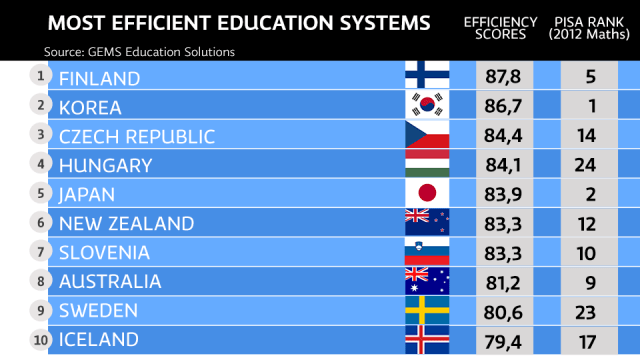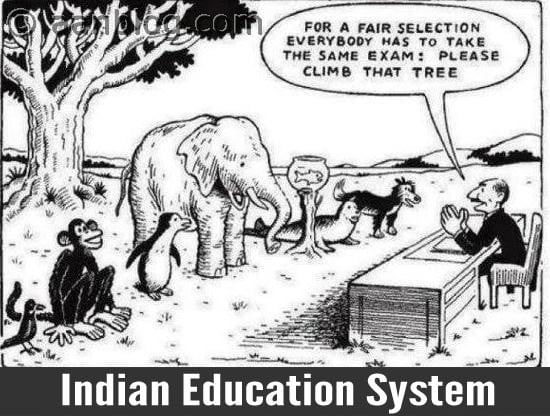Where in India we are busy stressing over the child’s marks and daily school performance, in Finland students have their first examination only when they turn 16, i.e initial schooling years are free of any examination.
Time and again Finland has proved its mettle in the level of education system the country has.
Yes, the same schooling system where students only attend a 4 hour school daily with almost no homework, a 75 minutes recess, first exam at the age of 16 and a deviation from the usual subjects by more focus being laid on problem solving and project based learning.
Basically learning that will help you in life.
Why is the Finnish model successful?
Students in Finnish schools spend more time studying issues and questions rather than completing the syllabus. This automatically eliminates the chance of any kind of rote learning which is heavily prevalent in India.
The assessment in the initial schooling years is also a verbal one rather than handing out grades. This comprehensive schooling system also gives the students as well as the teachers various entitlements.
This is the reason why 93% of them pass high school exams.
After a nine year school where basic education is completed (nine years because the Finnish children start the school at the age of 7), the students then aged 16 may opt either an academic track (lukio) or a vocational track (ammattikoulu), both of which usually take three years and give a qualification to continue to tertiary education.
Tertiary education is further divided into university and polytechnic.

Finland’s achievements
The Education Index, published with the UN‘s Human Development Index in 2008, based on data from 2006, lists Finland as 0.993, amongst the highest in the world, tied for first with three other countries.
Finland has consistently ranked high in the PISA study, which compares national educational systems internationally. Finland’s tertiary education also has been ranked first by the World Economic Forum.
Their greatest achievement lies in the fact that their hours of schooling and span is less but the outcome is much more even in the absence of routinely exams.
Also read: Why Indian Education Does Not Prepare One For Employment: ED VoxPop
Should India adopt such a schooling system?
Yes we definitely should, not only because it is successful in Finland but also because that makes it one of the most liveable and happiest country in the world.
The question is, can we?
Can we change our subjects? Can we change our methods? Can we have a 4 hour school? Can we make ‘Jack a not so dull boy?’
Can we really, when we have not even been able to make all of our population literate till now?
In Finland all schools are 100% state funded and a great autonomy is given to the schools and teachers, whereas in India it is quite the opposite.
When the CCE was introduced in our educational system it wasn’t a welcome move, it was not just because it was a change in our basic system but things were hassled also because it wasn’t implemented the right way.
Neither the teachers nor the students had any idea of how it would work and not a great effort was put into aiding and training the schools and teachers.

Study was surely project based but project based ‘learning’ was lacking.
Also we are unsure if a Finnish model where mugging up and conventional subjects are scrapped would be successful in rural areas or not.
How to strike a balance?
Each country’s education model is based on their country’s needs. We are two different countries and there is absolutely no need to completely mimic the model.
However a balance could be struck between Finland’s successful model and our country’s needs.
If a balanced system is implemented in a proper manner and teacher training is provided we can look ahead.
It is important that the teacher profession is given greater importance in India and given as much respect it so deserves.
India desperately needs to be saved from the overburdening syllabus that is indirectly promoting rote learning. Our schooling system is based on a rigorous scheme where students are compulsorily put through 6-7 hours of schooling plus extra hours of tuitions and extra classes which should considerably and necessarily be reduced.
The system of assessment can however vary from school to school with a final and only one exam serving an equivalent in the final year of comprehensive schooling.
Assessment can also vary from region to region.
The study ahead should be skill based and project based but should be introduced at rural level slowly only after a good level of school participation is achieved through state sponsored schemes.
It is time we start assessing our students on concepts, or on application rather than on content, memory and recall value.
Image credits: Google Images
You’d also like to read:
http://edtimes.in/2018/01/avoid-these-racist-and-offensive-words-for-a-healthy-conversation/





























